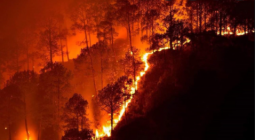NO MORE EXCUSES:'Unimaginable, Unforgiving World" without Drastic Emission Cuts, IPCC Warns

This story includes details about the impacts of climate change that may be difficult for some readers. If you are feeling overwhelmed by this crisis situation here is a list of resources on how to cope with fears and feelings about the scope and pace of the climate crisis.
Human activity is “unequivocally” producing a world of heat waves, wildfires, floods, sea level rise, and needless death and suffering, “it is more likely than not” that average global warming will exceed 1.5°C by 2040, and faster, deeper emission reductions will be needed to bring temperatures back below 1.5° by the end of the century, the Intergovernmental Panel on Climate Change (IPCC) concludes in a landmark science assessment released this morning.
“It is still possible to forestall many of the most dire impacts, but it really requires unprecedented transformational change—the rapid and immediate reduction of greenhouse gases,” IPCC Vice-Chair Ko Barrett told media.
But “today’s IPCC Working Group 1 Report is a code red for humanity,” said United Nations Secretary-General António Guterres. “If we combine forces now, we can avert climate catastrophe. But, as today’s report makes clear, there is no time for delay and no room for excuses. I count on government leaders and all stakeholders to ensure COP 26 is a success.”
Guterres added: “This report must sound a death knell for coal and fossil fuels before they destroy our planet.”
“If this IPCC report doesn’t shock you into action, it should. The report paints a very sobering picture of the unforgiving, unimaginable world we have in store if our addiction to burning fossil fuels and destroying forests continues,” said Helen Mountford, vice president of climate and economics at the World Resources Institute.
“While the IPCC’s findings are alarming, they most certainly should not translate to hopelessness or inaction,” she added. “This report should galvanize every country, company, city and citizen to fight like hell to avoid every bit of warming we can.”
The Energy Mix will be out tomorrow morning with a more detailed Special Report on the major conclusions of the IPCC report. To subscribe (or if you aren’t sure whether you already do), click here.
The report “throws a key goal of the Paris Agreement into danger as signs of climate change become apparent across every part of the world,” Bloomberg Green reports. It concludes that humanity “will have about a 50% chance of staying below the 1.5°C threshold called for by the Paris Agreement if CO2 emissions from 2020 onwards remain below 500 billion tonnes. At the current rate of emissions, that carbon budget would be used up in about 13 years. If the rate doesn’t come down, the planet will warm more than 1.5°C.”
The most ambitious of the IPCC’s five scenarios shows greenhouse gas emissions hitting net-zero by 2050, Bloomberg adds. But the team of 234 scientists from 66 countries says it’s “very likely” humanity will breach the 1.5°C threshold even sooner in a scenario of very high greenhouse gas emissions, The Independent reports. And the ability of the world’s oceans and to buffer global warming by absorbing atmospheric carbon dioxide will decline if emissions continue their rapid rise.
Only one of the five scenarios has average warming falling back below 1.5°, and “achieving that cooling will depend on large-scale removal of carbon dioxide from the air,” Bloomberg writes.
Climate Action Tracker’s analysis of countries’ latest emission reduction pledges under the Paris Agreement show the world on track for 2.7 to 3.6°C of warming by 2100.
“The report also warns that potential tipping points in Earth’s climate—thresholds where a small change could lead to dramatic change—’can’t be ruled out’. Such tipping points could include ice sheet collapse or abrupt changes to ocean circulation patterns,” The Independent states. “However, taking urgent action to address greenhouse gas emissions would minimize the likelihood of such tipping points occurring, the scientists said.”
The IPCC also stresses “that dramatic and rapid cuts in super-potent methane would have a significant impact, not just on global heating but more immediately on air quality,” the UK-based paper adds.
“Climate change is not a problem of the future—it’s here and now and affecting every region of the world,” said IPCC author Dr. Friederike Otto, associate director of the Environmental Change Institute at the University of Oxford.
Exceeding the 1.5°C target in the 2015 Paris agreement “doesn’t necessarily constitute a failure of our climate policies,” said IPCC author Prof. Piers Forster, director of the Priestley International Centre for Climate at the University of Leeds. “We want to clearly get across that every bit of additional warming we can prevent is really a success.”
“Those of us living in Africa have been aware of the urgency of the climate crisis for many years,” said Mohamed Adow, director of Nairobi-based Power Shift Africa. “Lives and livelihoods have been shattered by overwhelming heat, rising seas, and extreme weather. It is vital that governments heed the warning of the IPCC’s scientists and act with speed and boldness to make our world safer, cleaner, and greener.”
The IPCC’s new analysis “makes clear that the warming we’ve experienced to date has made changes to many of our planetary support systems that are irreversible on time scales of centuries to millennia,” the BBC writes. “The oceans will continue to warm and become more acidic. Mountain and polar glaciers will continue melting for decades or centuries.”
“The consequences will continue to get worse for every bit of warming,” said University of Reading climatologist Prof. Ed Hawkins. “And for many of these consequences, there’s no going back.”
Since 1970, the BBC reports, “global surface temperatures have risen faster than in any other 50-year period over the past 2,000 years.” The scientists say those changes are “already affecting many weather and climate extremes in every region across the globe,” from heat waves to floods, and “their attribution to human influence has strengthened” over the past decade.
The science concludes that:
• The past five years have been the hottest on record since 1850.
• The past decade was most likely the hottest in 125,000 years, a time when sea levels were 10 metres higher.
• Global surface temperatures were 1.09°C higher in the last decade than they were between 1850 and 1900.
• Fossil fuel burning and deforestation have driven carbon dioxide levels in the atmosphere to a two-million-year high.
• Agriculture and fossil fuels have brought methane and nitrous oxide levels to an 800,000-year high.
• Sea level rise has nearly tripled compared to the decades between 1901 and 1971.
• Human activity is 90% likely to be the main cause of glacier loss since the 1990s and decreases in Arctic sea ice.
• It’s “virtually certain” that extreme heat waves have become more frequent and intense since the 1950s, while extreme cold has become less frequent and severe.
“Even as the IPCC authors have done away with some of the cautious uncertainty that marked past assessments, the last few months have seen a series of rapid-fire climate disasters that underline the new language,” Bloomberg writes. “Summertime in the Northern Hemisphere has been marred by severe flooding across Europe and China, as well as alarming drought and the early onset of large wildfires in the Western U.S. and Canada. One of the coldest places on the planet, Siberia, has experienced severe heat and forest fires. Just this past weekend brought disturbing footage of people fleeing sprawling wildfires in Greece.”
And with major advances in scientific understanding, “nearly all of this can be attributed to human influence,” the news agency adds. “The contribution to global warming of natural factors, such as the sun and volcanoes, is estimated to be close to zero. In fact, humans have dumped enough greenhouse gas into the atmosphere to heat the planet by 1.5°C, according to the report, but fine particle pollution from fossil fuels provides a cooling effect that masks some of the impact.”
Even with global warming all but certain to exceed the 1.5°C threshold, the takeaway message from IPCC scientists, UN officials, and this morning’s wave of news coverage is that it’s time to accelerate climate action and greenhouse gas reductions—not to give up.
“By mid-century, the world’s choices on how fast to limit carbon pollution will start to lead to divergent climates,” Gizmodo writes. “Curtail emissions rapidly and now, and global warming will halt around 1.5°. If world leaders make unprecedented changes to every economic sector and society at large to stop emissions, we will still likely cross 1.5°. But we can bend the curve back in the right direction and, by the end of the century, keep the climate from going off the rails.
“Continue emitting, though, and the world will heat up further. Doing so will come with major consequences. Not all life will be able to adapt to the new, hotter, more dangerous conditions.” But “that doesn’t mean we should throw in the towel. In fact, the report shows we can’t. Decarbonization is our only path to survival,” and “every tonne of carbon pollution and every tenth of a degree matter.”
9 August 2021
The Energy Mix




